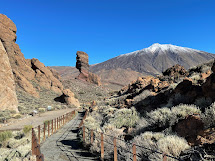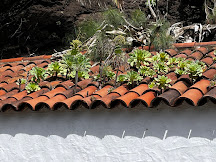Mt. Teide last erupted in
1909 and the tour guide assured her busload of patrons the magma entrails of
this massive volcano were still empty and we would survive the day. It’s the
third tallest volcano in the world, trailing only Moana Loa and Moana Kea on
the Big Island. If measured from the ocean floor Mt. Teide rises over 24,000
feet in elevation.
The mountain is hard to
miss, it looms menacingly behind our resort, catching clouds, and casting a shadow
in the afternoon far enough to reach the island of Gran Caneria, roughly 40 km
away, in the afternoon, and the Mt. Teide National Park is a major tourist
attraction. Estimates say 3 million people visit the park yearly.
 |
| Mt Teide from Las Canadas Caldera |
GET US OUTTA HERE!
Janet found a day-long
bus tour that took us to see Mt. Teide and several small villages on the north
of Tenerife. It was a very welcome diversion from the crass commercial tourism
of Tenerife Sud, where our resort is located. Tenerife has so much more to offer
than time shares and bars and nightclubs.
But before we could
begin the ascent to Mt. Teide, the bus tour had to pick up several other
passengers in the Playa de las Americas area. This is where most of the raucous
nightlife is and the area swells with bars and nightclubs and attractions and
hotels. It is much busier than our area and it took a long time to pick up
everyone, and it was good to finally get on the road again.
By the time we reached Vilaflor,
at 1,400 meters elevation the highest village in Tenerife, we had been on the
road for nearly two hours and the Cafeteria la Paz was a welcome rest stop. There
we had a Canarian coffee specialty drink, a Barraquito. In the thin cold air,
we enjoyed our espresso with condensed and whole milk, cinnamon, lemon zest and
Tia Maria all floated to form different layers in the glass. After admiring this
Canarian drink, you’re supposed to then stir all the flavors together, but we
didn’t have much time to savor our Barraquito for long because we had to get
back on the bus. As we were on a tight
schedule and had much to see this day, there was no time to admire a local
coffee drink or to explore the old growth pine tree forest found at this
elevation. Although many cars were stopped by the local attraction a monstrous pine tree called El
Pino Gordo, our bus only drove by it slowly on the way to Mt. Teide.
 |
| BARRAQUITOS |
Snow on top – Fire below
/ Mt. Teide
The road to Las Canadas
Caldera of Mt. Teide (you never actually reach the summit unless you take a cable
car to the snow-covered peak) steadily climbed along countless switchbacks passing
through the tree line to a barren landscape of older and newer lava flows. The
black lava is newer, the reddish tinted lava from the older iron-rich lava has
oxidized over time.
We were stopped for
awhile along with several buses and cars because the road was closed due to ice,
so we were allowed out to take pictures of the mountain peak, before road crews finally gave the all clear. This cut into our time at the prescribed stop,
halfway between a hotel and a viewing area for the Tree of Rock and we had all
of 20 minutes to chose between dashing to the hotel for a coffee or a bathroom
break or to admire what is perhaps the most photographed features on all of
Tenerife.
 |
| TREE OF ROCK |
The Tree of Rock is a precariously looking spire that formed when different
layers of rock eroded, its structure reminiscent of Arches National Park in
Utah.
We chose the Tree of Rock.
Drago Milenario / Dragon
Tree
We descended the north
side of Mt. Teide into a more fertile wet climate. Generally, Tenerife Sud is
hotter and dryer than the north where it rains more often.
Our next stop was the
village of Icod de los Vinos. First settled in the early 1500s this pleasant historical
village is home to vineyards, orchards, banana plantations and the Dragon Tree,
listed with UNESCO as a World Heritage site. Purported to be 1,000 years old,
the Dragon Tree is a majestic massive tree that yields a red resin called
Dragon’s Blood when cut.
 |
| DRAGON TREE, ICOD de los VINOS |
The bus dropped us off at
one end of the historical district and picked up at the other end. Along the
way we stopped to admire the town square and the Dragon Tree, mindful of “long
fingers” or pickpockets known to work in the area.
Again, there was no
time to linger and we could only view the tree from a distance in the Plaza de La
Pila. There was no time to stroll in the Parque del Drago, although the Plaza de
La Pila was beautiful and surrounded by grand old homes dating from the earliest
times of the village.
We took our lunch at Restaurante
Carmen for a serviceable meal at 15 Euros a piece. They offered a glass of red
or white wine, soups, Janet had a very good Canarian soup, with beans and
smoked ham, Pink Bream, pork chops or chicken as the main, and either a coffee
or flan for dessert… oh and a roll.
Going to Garachicco
Though we didn’t have a
lot of time in any one place while on this tour, we did get to see quite a bit
and we got to experience a bit of Spain, rather than the tumult of a tourist
area. Our original thoughts were to see what was out there on Tenerife and afterwards
consider renting a car to revisit some areas that we would have enjoyed
lingering at for a while longer than the tour allowed.
Garachicco was yet
another village that was so enchanting, but we only got a quick twirl around
the historic quarter by the tour guide who told us the city was mostly destroyed
by a volcanic eruption in 1706. It had been the island’s main fishing and trade
port until then.
 |
| GARACHICCO |
She twirled us past the
new marina with the swimming holes formed by the old lava flows, she twirled us
past a picturesque square and stated that the lifestyle of the Canarian would
be to linger beneath the trees in the park to drink coffee and linger with
friends. She twirled us past a fort built to protect Garachicco from pirates as
Tenerife was often the first island treasure-laden ships from the Americas
would hit on their return voyages.
So much to see and so
little time. Janet and I strongly considered renting a car to return to the
area and explore further. But we changed our mind after visiting the small
mountain village of Masca, the last stop on our tour
Masca Mountain Hop
There wasn’t even a
road to this tiny hamlet until the 1970s. Originally a Guanche, the indigenous
people of the Canary Islands, settlement was previously only accessible by
climbing the deep ravines from the ocean.
 |
| MASCA TENERIFE |
It is really nothing
more than a collection of rural houses connected by rough hewn stone walkways,
but it is one of the top tourist attractions on Tenerife. There is a trail that
goes down to the Atlantic Ocean, but the strenuous hike takes hours and typical
of the day we had but a half hour to explore, just enough time to find a quiet
leafy spot for a coffee.
 |
| MASCA |
Being in a tour bus was
a blessing and a curse. Because we were on a “schedule” we could not linger if
something caught our interest, which would be the case if we were driving
around on our own. But, being on a tour bus meant we would did not have to negotiate
the road into and out of Masca on our own. Treacherous, narrow and with every switchback
threatening to hurtle us into the deep chasm if we took it wrong, all we had to
do was put on our seat belts and somehow enjoy the majestic scenery.
 |
| ROAD TO MASCA |
More than once the bus
would have to back up a bit to make nearly 360 degrees turns and when passenger
cars approached you could almost feel the panic as they swerved to allow the relative
behemoth to pass. White knuckled, Janet and I decided right then to leave the driving
to them!
When we descended out
of the Masca Gorge with everyone still alive the bus erupted into applause for
our driver Pedro.
As the bus made its way
back to Playa de las Americas to drop off passengers, the swirling, rush-hour
traffic seemed calm in comparison.
PARTICULARS
Janet booked the $40 USD
trip with Tenerife Sunshine Excursions through TripAdvisor.
Love Janet and greg
© 2022 by Gregory Dunaj



































No comments:
Post a Comment